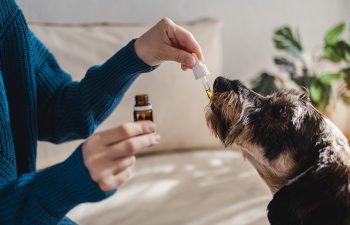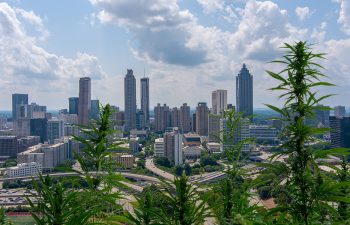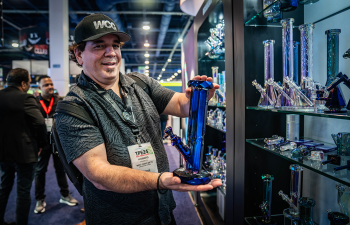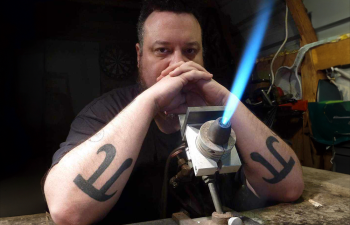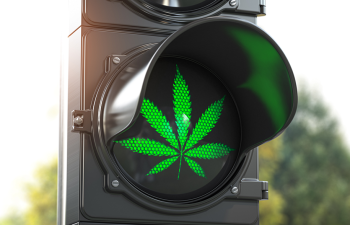Are we ready for full-blown legality?
One of the effects of magic mushrooms is time distortion. Ten seconds staring at the night sky can stretch out like thick honey, offering a semester’s worth of philosophy contemplation, while an hour’s walk in the woods can fly by with the speed of a blink.
Maybe that’s why it feels like entheogens are having their moment and, at the same time, just about to break big. It’s their nature to change how we perceive time.
Consider the present. The first state-licensed psychedelic mushroom facility in Oregon opened its doors this year, as amateur growers in a handful of other states and cities received the okay to cultivate and give away their mushrooms. Over the summer, Super Bowl-winning quarterback and occasional “Jeopardy!” host Aaron Rodgers brought a swarm of media attention to Psychedelic Science 2023 when he spoke alongside notable figures like former Republican (!) Gov. Rick Perry; author Michael Pollan; and a host of academics from places like Columbia, Yale, and MIT.

Time was clearly on Rodgers’ mind when he asked the 12,000-person crowd, “Is it not ironic that things that actually expand your mind are illegal and things that can keep you in the lower chakras and dumb you down have been legal for centuries?”
But as he outlined a future when all people know “the actual wisdom and truth” of psychedelics, another group of hopefuls felt clay-booted time’s heavy steps moving in a different direction. For Bruce Perlowin, the CEO of Hemp Inc., the entire natural healing movement is not so much on the cusp of a new beginning as it is retreading old ground.
“The big picture is that the industry is circling back around to people-to-people marketing,” he said. “And the guys that started it will probably be the guys that finish it. Not the big corporate giants.”
If you’ve heard of Bruce Perlowin, it’s because he was once one of the biggest drug smugglers in the country. His life story sounds like a movie, if Tony Montana built his empire on weed instead of cocaine: Perlowin lived in a mansion, owned a pier in the San Francisco Bay, and commanded a 90-vessel fleet that imported weed into the U.S. with the kind of precision Amazon only dreams about.
Now in the legal cannabis space, he’s watched recreational and medicinal marijuana weather a glut of investments from outsiders who tried to bring a corporate slickness and hip marketability to a product that has been around for centuries. He says it’s no wonder that angel investors haven’t been rewarded for funding cannabis companies like tech startups. That approach misses the inherent personal connection that medicine requires. Instagram achieved unicorn status because of what it allowed us to show others. If entheogens take off, it will be because of what they allow us to show ourselves.
“[If the law changes] you’re gonna have 50,000 people tomorrow selling psilocybin. But there’s not gonna be any big winners in the psilocybin game. People can get it from anywhere, just like they can get black market pot from anywhere. So, it’s gonna be a rough business for these guys who are going to come in to try to create a name for themselves and build a brand,” he said. “If it were me, I would do multi-level marketing. That’s what happens when you go to your friend, and say ‘Here, try this. I’m here. It’s cool. You’re not gonna get crazy buzzed. You’re just gonna get a nice little trip. You’ll feel good.’ And they’ll try it with their friend. But I’m not so sure how comfortable they are buying it off the internet from somebody they don’t know. It’s a friend-to-friend type of type of business.”

The laws seem to agree. Or if they don’t, perhaps you could see it that way. In Oregon, magic mushrooms are viewed as a strictly two-person drug. To take them legally, users visit a licensed facility, where they dose and sit with a “facilitator” who guides them through the process and offers help should anything feel off. In other areas, like Colorado and a smattering of municipalities, magic mushrooms laws are designed to be non-corporate. Anyone can grow the mushrooms, they dictate, but selling them is illegal. If you squint, you can read an acknowledgement that tripping mushrooms should be a friend-to-friend operation.
And that personal touch is what Perlowin sees as the spirit of the 70s resurrected, like platform shoes and feathered hair. In those days, underground information moved slowly. There was no dark web or alt podcasts. For psychonauts and natural healing enthusiasts, the only places to find information on shrooms came from books and printed magazines. And, of course, through friends.
Embracing that attitude can help move along the fight for legality, said Barry Epling, a long-time cannabis business executive and consultant for Perlowin’s company.
“How long it takes to be approved is going to be based upon how it’s presented,” he said. “If it is presented to people who have never taken hallucinogens as ‘If you take this, you will see God and everything will be great in your life’ then I’m not convinced that’s necessarily the way to convince anyone it’s the right idea. But, if you can have one hundred million people microdosing, and their lives are better, they’re living longer, they’re more effective in their work, they’re less ill, then at that point, you’ve got an incredibly powerful reason to legalize.”
This hits at the crux of the matter. There are two fundamental questions about entheogens that simply can’t be answered well. The first is: “What, exactly, do they do?” The answers to this question split into a clinical or emotional category. One message is that psychedelic therapy has been shown to help with mental issues, like PTSD, depression, and alcoholism. This is the tack the FDA used when declaring them a “breakthrough therapy” (although stopping short of full-throated endorsement). The other answer is that magic mushrooms brighten colors, enhance the feel of nature, create hallucinations for good or bad.
But what if shrooms can deliver benefits without the trip? Do the benefits that entheogens deliver for mental illnesses come solely from how they interact with our neural circuitry—or is the emotional experience a required part of the process? Just how much personal growth do we give up without them?
“I don’t believe psilocybin will be used for recreation,” Epling said. “I’m not saying that people won’t do it, and I’m not saying that there won’t be a lot sold that way, but there are 350 million people in the United States, and at least 100 million have a difficulty dealing each day with the emotional stress that they have. Microdosing helps that a lot. With microdosing there is no discernible effect.”
The other fundamental question that entheogen advocates must answer is: What is the best way to deliver psychedelics to the public? No country has produced a model so reliable as to create a standard for adoption. After a series of mostly tourist-related incidents in Amsterdam, magic mushroom sales were banned in 2008 (although less-potent “truffles” of psychedelic fungus are still lawful). Some nations, like Brazil and Jamaica, outlaw the sale of psilocybin but say nothing of possession, leading to a tenuous and unevenly applied legality. And in the U.S., state and local governments are piloting different legal approaches that all seem designed to anger one segment or another of psychedelic advocates.
What entheogens face now—and in the future—is whether we’re ready for a brighter legal color palette or if we need our laws painted in retro black-and-white. Only time will tell.




